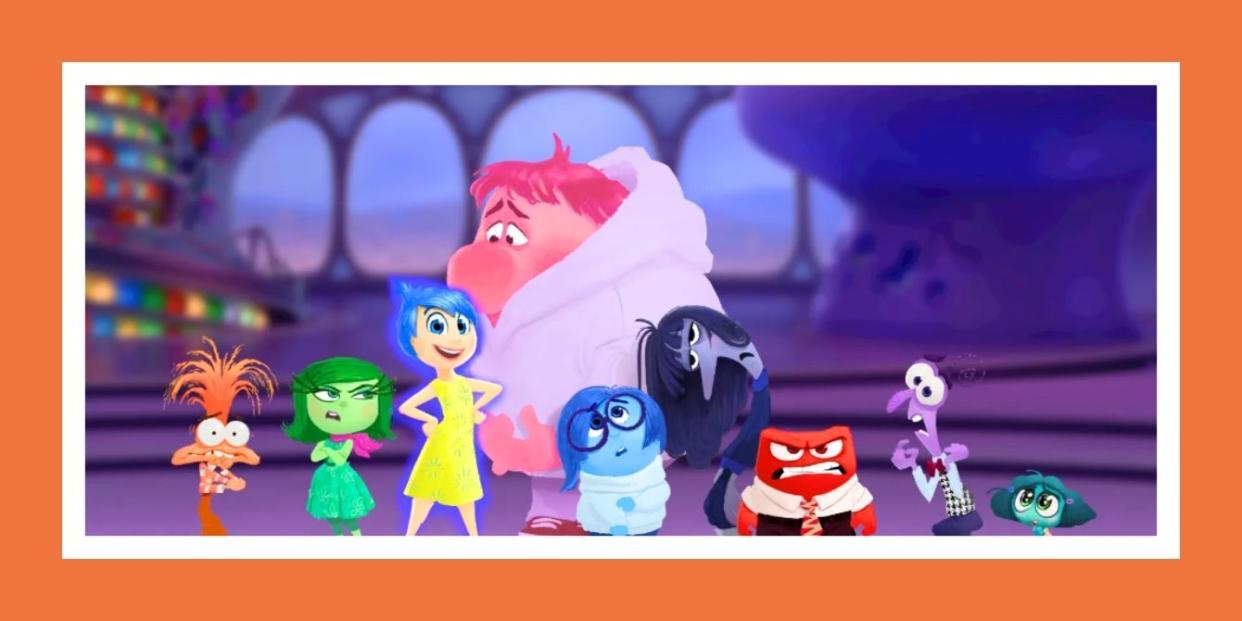‘Inside Out 2’ has parents wondering if they need to worry about teen ennui

If you’re among the many families who have seen “Inside Out 2,” you know that Riley, who navigated a lot of emotions as she dealt with her family’s big move from Minnesota to San Francisco in the first movie, is back — and has even more emotions than ever. In the sequel, Riley, now a 13-year-old, is dealing with all the ups and downs that life brings for teenagers, which includes some new emotions she hasn’t dealt with before. These include Anxiety (voiced by Maya Hawke), Envy (voiced by Ayo Edebiri), Embarrassment (voiced by Paul Walter Hauser), and Ennui (voiced by Adèle Exarchopoulos).
“Riley’s life requires more sophisticated emotions than all of you,” Anxiety says in the movie, as Embarrassment scoops up the original five emotions, Joy, Sadness, Fear, Anger, and Disgust, and holds them back while the new emotions take over Headquarters.
But the emotion that’s really caught parents’ eye is Ennui, who embodies those teenage traits of disaffection and ambivalence we all know so well. The character wears a constant frown, downcast eyes, and a drooping stance that causes her hair to hide her face. When Anxiety first introduces Ennui to the original emotions, they (like many people in the audience) don’t know what the word means. French actor Adèle Exarchopoulos, who voices the character, explains, “It’s what you would call the boredom,” then lets out a loud sigh and flops onto a couch, staring into a phone. Ennui is also known as feeling listless and dissatisfied.
It’s notable that Ennui’s smartphone doubles as a remote for the main control console, allowing her to manage Riley’s emotions without ever getting up from the couch she spends most of the movie occupying. Ennui may take a back seat to the other emotions, responding only minimally to the drama with dramatic sighs, yawns, by rolling her eyes, or through sarcastic one-liners and put-downs—but she’s far from insignificant. The seemingly detached coolness is how the movie makes sense of boredom’s role in Riley’s emotional life, as she transitions from child to teenager.
“Most people understand more commonly used terms like ‘depression’ or ‘boredom,'” Theresa Nguyen, chief research officer with Mental Health America, told Newsweek. “Human beings are not great at identifying emotions. When you ask somebody how they feel it’s ‘bad,’ ‘good.”
“It’s really awesome that when Riley hits puberty, we are introducing the idea of complex emotions,” Nguyen said.
Also, the overstimulation that naturally occurs after using technology for an elongated period of time usually results in irritability—especially in kids.
In other words, these are feelings that are pretty normal for teens. Amy Poehler, who voices Joy, said at 2023’s D23 expo, “There’s a lot of very complicated feelings about who am I, where do I fit it? Sometimes your brain is not your friend. But then also, it’s a time of real exploration, letting things go that don’t work for you anymore, taking big swings and big chances. You’re supposed to make a lot of mistakes. It’s an adventurous time and it can be really treacherous.”
Is teen ennui something parents need to worry about?
Some ennui is a normal part of puberty, but teenage mental health struggles are on the rise, so know the signs of a more serious problem that could indicate that your child needs to talk to their doctor or a mental health professional—like withdrawing from their friends, loss of interest in activities they usually enjoy, or signs of self-harm or substance abuse.
Here are a few points for parents to consider:
Hormonal changes—Adolescence is a time of significant hormonal shifts, which can contribute to mood swings, restlessness, and a general sense of ennui. As long as this is a temporary phase and the teen is still engaging in normal activities, it may not be a major concern.
Depression—In some cases, ennui can be a symptom of depression or other mental health issues. If the ennui is accompanied by other signs such as persistent sadness, withdrawal from activities, changes in sleep or appetite, or suicidal thoughts, it’s important to seek professional help.
Lack of motivation—Ennui can sometimes be a sign of a lack of purpose, direction, or motivation in a teen’s life. This could be due to factors such as academic struggles, social issues, or a lack of engaging extracurricular activities.
Boredom—In some cases, ennui may simply be a result of boredom or a lack of stimulating activities. Encouraging the teen to explore new hobbies, sports, or creative pursuits can help alleviate this.
While some level of ennui is normal during adolescence, parents should be mindful of its duration and severity. If the ennui persists for an extended period or is accompanied by other concerning symptoms, it may be helpful to have an open conversation with the teen, seek guidance from a school counselor, or consult a mental health professional. Providing support, encouragement, and opportunities for engagement can help teens navigate this phase and find renewed purpose and motivation.

 Yahoo News
Yahoo News 
